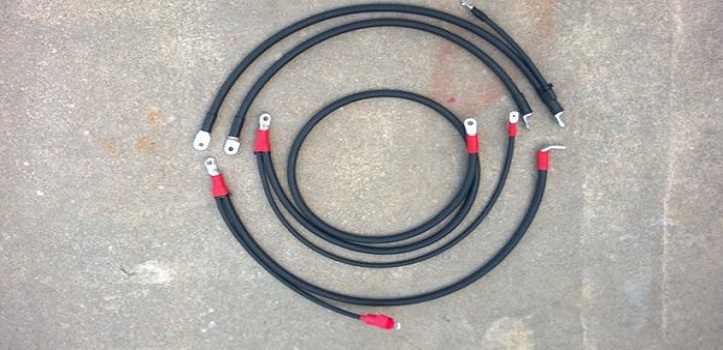Battery cables are medium which connect battery, load and charging systems. These cables power the electrical devices and are available in 8 gauges; 6 gauge is the smallest cable and the 4/0 is the largest.
Every battery cable has a different use, like
- 6 gauge AWG Automotive Battery Cable- Used for 12 and 24 volt electrical devices.
- 4 gauge AWG Battery Cable- Used for automotive and marine uses.
- 2 gauge AWG Battery Cable- Used for low voltage electrical systems.
- 1 gauge AWG Battery Cable- Used for low current transmission; generally made from copper core.
- 1/0 gauge AWG Battery Cable- Used for high current flow up to 60 volts.
- 2/0 gauge AWG Battery Cable- Used for connecting batteries, starters, amplifiers and solar panels.
- 3/0 gauge AWG Battery Cable- Used in the automobile industry and layered with PVC insulation.
- 4/0 gauge AWG Battery Cable- Used for high voltage transmission and comes with a thick outside diameter.
So what are the criteria for choosing the best battery cables?
- Proper size- Undersized battery cables are not able to handle load properly. Small cables may also lead to immense voltage fluctuations. This is the reason choose battery cables for which the length can be customized; 25 sq. mm to 95 sq. mm cables are generally available in the market. While choosing the battery cable length the following factors should be kept in mind-
1)The amperage and
2)Both positive and negative cable length.
- Anti-corrosive-Choose cables which are rust free and flexible to work under harsh chemical environments. The best battery cables manufacturers provide you cables which are even resistant to sulphuric acid and are made from oxygen free copper.
- Highly insulated- The battery cables must be able to withstand high degrees of temperature; the standard cables available in the market can absorb as much as 90 degrees of heat at once. You can get insulation in battery cables with the following raw materials-
1)Insulation terminal boots
2)Bare copper, silver, tin, lead
3)Press welded, crimped or compression terminals
- Highly conductive- The battery cables transmit electricity and hence must be made from high grade conductive materials. The welded connectors and considered more effective than ferrule designs.
Which types of battery cables are available in the market for use?
- Automotive Battery Cables- These cables can be used both as auto wiring for starters and as connectors for battery ground circuits. These are strong connectors between the car battery and the starter.
- Firewall Battery Cables- These cables run through the firewalls and forma tight blocking. Bushing seals are used after the installation is complete so that the cables are insulated.
- PVC Insulated Battery Cables- These supply current for the starter motors of cars, trucks, tractors, electric traction vehicles and off-road vehicles.
- Solar Battery Cables- Primarily used for manufacturing solar devices.
Traction Battery Cables- Made from insulated copper wires, these cables act as inter-connectors between the cells.The traction battery cables available in the market are-
1)Cast leads
2)Lead strips
3)Copper strips
4)Longer cell take off leads
The premium battery cables manufacturers provide you will customized battery cables which can improve the efficiency of the batteries.

